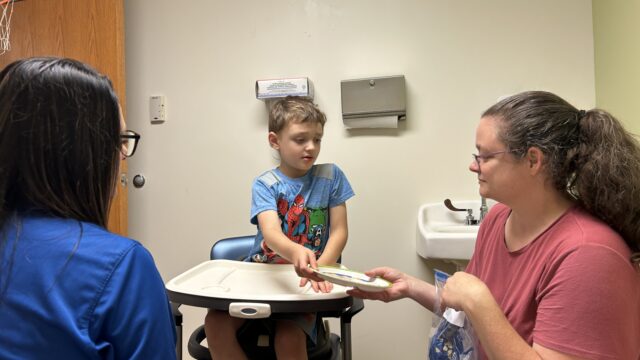Nutrition Counseling
Eat better for better health
A good diet is essential to your overall health, but with so much “advice” available, knowing what a good diet is can be confusing.
Nutrition counseling can help you learn how to eat better, lose weight or how to best manage certain health conditions.
Nutrition counseling uses a personalized approach to help you make better nutrition choices to meet your individual health needs.
Your physician or dietitian will evaluate your current diet and make suggestions for improvements, such as adding more fruits and vegetables to your diet, cutting calories or reducing your intake of fatty foods.
What is a Healthy Diet?
A healthy diet starts with the right amount of calories from protein, carbohydrates, fat. Good nutrients can be found in lean meats, low fat dairy products, whole grains and fruits and vegetables.
Depending on your medical condition, you may need to alter your diet, such as limiting salt if you have high blood pressure or kidney conditions, or reducing calories to lose weight. Your primary care physician or dietitian will work with you to find the right balance to optimize your health.
Nutrition counseling works best when paired with exercise and preventative health screenings to help you manage your health and prepare your body to live a longer life.
Nutrition counseling can help you achieve a healthier lifestyle and improve your nutrition through the following services:
Education and Management of Health Conditions
Learn what foods are right for your particular needs, depending on your sex, age and medical conditions.
Nutrition can play a vital role in managing chronic health conditions. You’ll work with your healthcare team to make food choices that assist you in maintaining good health.
Referral to Specialists
If you have diabetes or other conditions that affect your diet, you may be referred to a registered dietitian for further education and to develop an individualized nutrition plan.
What to Expect from Nutrition Counseling
Nutrition counseling uses a personalized approach to help you make better nutrition choices to meet your individual health needs.
Your physician or dietitian will evaluate your current diet and make suggestions for improvements, such as adding more fruits and vegetables to your diet, cutting calories or reducing your intake of fatty foods.
What is a Healthy Diet?
A healthy diet starts with the right amount of calories from protein, carbohydrates, fat. Good nutrients can be found in lean meats, low fat dairy products, whole grains and fruits and vegetables.
Depending on your medical condition, you may need to alter your diet, such as limiting salt if you have high blood pressure or kidney conditions, or reducing calories to lose weight. Your primary care physician or dietitian will work with you to find the right balance to optimize your health.
Nutrition counseling works best when paired with exercise and preventative health screenings to help you manage your health and prepare your body to live a longer life.
Nutrition counseling can help you achieve a healthier lifestyle and improve your nutrition through the following services:
Education and Management of Health Conditions
Learn what foods are right for your particular needs, depending on your sex, age and medical conditions.
Nutrition can play a vital role in managing chronic health conditions. You’ll work with your healthcare team to make food choices that assist you in maintaining good health.
Referral to Specialists
If you have diabetes or other conditions that affect your diet, you may be referred to a registered dietitian for further education and to develop an individualized nutrition plan.
- How will nutrition counseling help me improve my health?
- What are some simple steps I can take to improve my diet?
- What if I can’t make a lot of changes all at once?
- Do I have to stop eating all of my favorite things?
- Will I lose weight?
- What else can I do to improve my health and wellness?
Questions to Ask Your Provider about Nutrition Counseling
- How will nutrition counseling help me improve my health?
- What are some simple steps I can take to improve my diet?
- What if I can’t make a lot of changes all at once?
- Do I have to stop eating all of my favorite things?
- Will I lose weight?
- What else can I do to improve my health and wellness?


